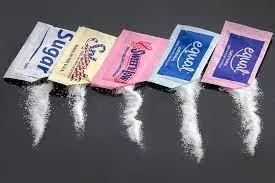As a performance physical therapist in Wilmington, NC, my primary focus lies in optimizing the health and well-being of my patients. While that often focuses on working on mobility, strength and stability, we can’t overlook some other factors, including stress management, sleep quality, hydration and diet. Over the years, I have witnessed an increasing trend in the consumption of artificial sweeteners as a substitute for sugar. While these sweeteners are often touted as a “healthier alternative”, recent research has shed light on their potential neuroexcitatory effects.
Neuroexcitatory means an increase in the activity of neurons, or nerve cells. Neurons are the basic units of the nervous system, and they communicate with each other by sending electrical signals. Neuroexcitatory substances can increase the strength or frequency of these signals, sending your nervous system into overdrive. In this blog, we will explore the impact of artificial sweeteners on the nervous system and discuss their implications on specific populations, such as people dealing with chronic pain or inflammation and common nerve issues such as sciatica.
Artificial sweeteners are synthetic (manmade) substances used to enhance the sweetness of various food and beverage products, while providing fewer calories than sugar. Common examples include aspartame, saccharin, sucralose, and acesulfame potassium (check out the end of the blog for a longer list). These sweeteners are widely used in diet sodas, sugar-free snacks, and low-calorie desserts, appealing to individuals seeking weight management or individuals with diabetes. For my athletes out there, they are also found in many pre-workout and recovery supplements like BCAAs.
Research suggests that certain artificial sweeteners, particularly aspartame, may have neuroexcitatory effects on the brain and nervous system. Neuroexcitation refers to the activation or stimulation of nerve cells, which can result in increased neuronal firing and potential negative effects on the central nervous system. If you are dealing with nerve issues, consumption of these artificial sweeteners may be contributing to your symptoms and increasing your recovery time!
Studies have shown that artificial sweeteners, when ingested, can impact neurotransmitter levels and disrupt the delicate balance of brain chemistry. Excitatory neurotransmitters, such as glutamate, are responsible for stimulating nerve cells, promoting alertness, and enhancing cognitive function. Excessive activation of these excitatory pathways may lead to an imbalance, potentially resulting in symptoms like headaches, migraines, and even mood disturbances.
Chronic low-grade inflammation has been implicated in various neurodegenerative diseases, such as Alzheimer's and Parkinson's. Neurodegenerative refers to the breakdown or death of nerve cells, or neurons. Neurons are the basic units of the nervous system, and they play a vital role in everything from movement to thought. When neurons die, it can lead to a variety of problems, including memory loss, difficulty walking, and impaired cognitive function. Some studies suggest that artificial sweeteners could contribute to neuroinflammation (inflammation within the brain), further exacerbating the risk of developing these conditions. Although the mechanisms behind this connection are still being investigated, it is believed that certain sweeteners may trigger an immune response, leading to inflammation in the brain.
While the neuroexcitatory effects of artificial sweeteners are a cause for concern, it is crucial to consider the overall context of an individual's health. The occasional consumption of these sweeteners is unlikely to have significant consequences for most people. However, those struggling with chronic pain, sciatica or a predisposition to migraines may be more susceptible to the potential adverse effects.
As a physical therapist, my primary goal is to empower individuals to make informed choices that enhance their overall well-being. I encourage my patients to take a balanced approach to nutrition, including consumption of whole foods, regular exercise, and mindful eating habits, which can help mitigate the potential risks associated with artificial sweeteners. If you think artificial sweeteners might be impacting your health, I recommend reading ingredient labels. Some of the worst offenders include energy drinks and health supplements like pre-workout and post-workout/recovery powders, even protein powders!
Here is a list of some “hidden” artificial sweeteners to look out for:
- Acesulfame potassium (Sweet One, Sunett).
- Advantame.
- Aspartame (NutraSweet, Equal).
- Neotame (Newtame).
- Saccharin (Sweet'N Low).
- Sucralose (Splenda).
- Luo han guo (Monk Fruit in the Raw).
- Purified stevia leaf extracts (Truvia, PureVia, others).
Thanks for reading!
In good health,
Dr. Eliza Cohen, PT, DPT, CPT, NTP
Conquer Movement - Wilmington, NC

